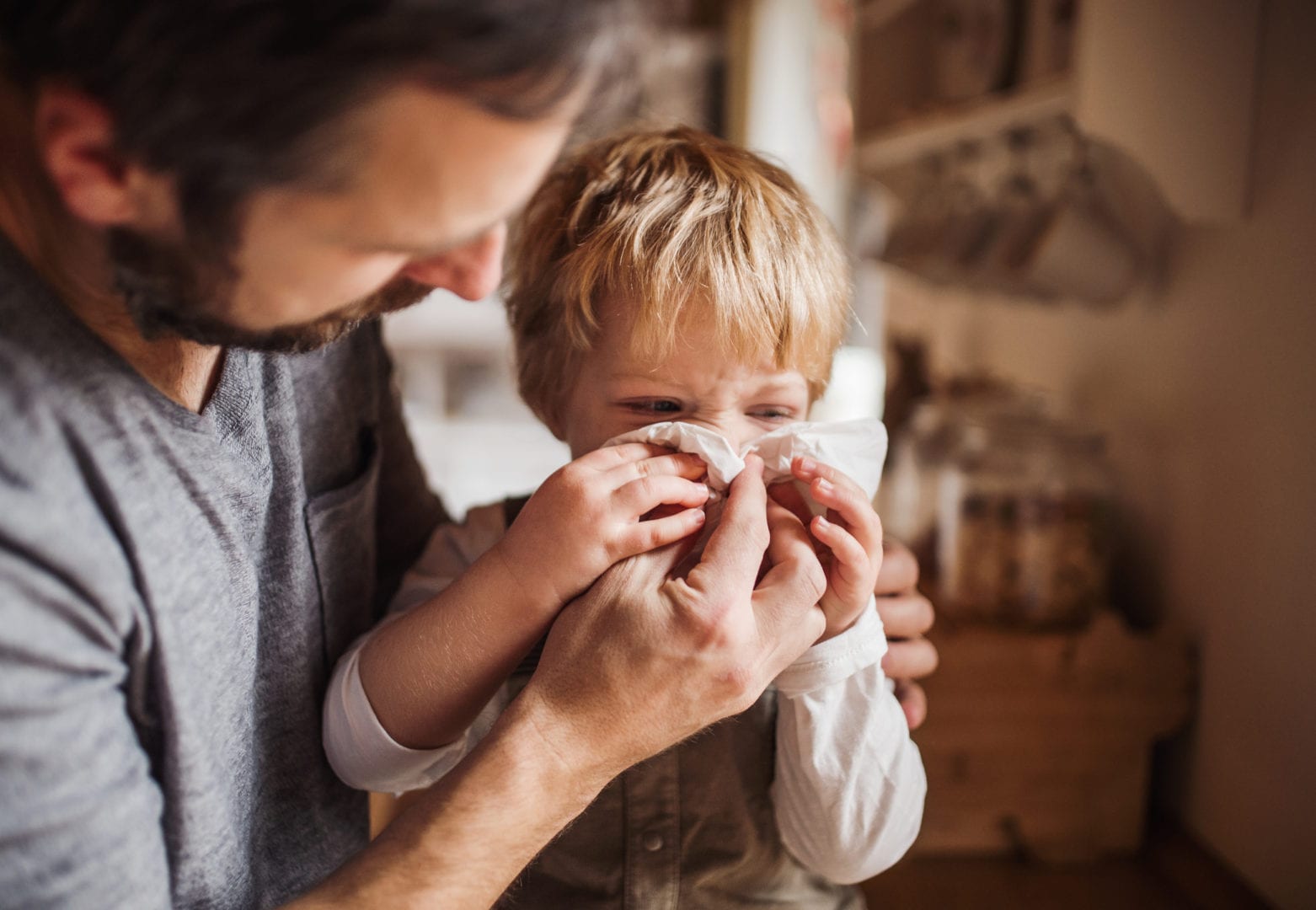When your child is obviously ill and contagious, keeping them home from daycare is a no brainer. But other times, it’s a tougher call to make. For instance, if your kid had a fever the previous day, but generally seems fine today, is it OK to send them back? Or should they stay home again just to be sure, despite the fact that they’re bouncing off the walls (and you have a mound of work piling up)?
Fortunately, when it comes to keeping your child home from daycare, there are prevalent rules that help take out the guesswork (not to mention, your child’s daycare likely has an exclusion policy that lays most things out). “In general, children can return to daycare after the signs and symptoms of illness have subsided or they’re cleared by their physician to go back,” notes Dr. Steven Abelowitz, pediatrician and founder and medical director of Coastal Kids Pediatrics.
Of course, some illnesses can feel more vague than others. Read on for specific expert input on when to keep your child home from daycare and when it’s OK to send them.
When is a child too sick for daycare?
There are a few instances when there is no gray area in terms of determining whether or not your child can go to daycare. According to Dr. Sara Siddiqui, a pediatrician at NYU Langone Huntington, they are:
- Fever.
- Vomiting.
- Persistent diarrhea.
- Uncontrollable cough.
- New onset rash that is unknown.
- Extreme fatigue.
“Other reasons would be if they are not able to drink fluids or are having difficulty recovering from an illness,” she says.
Abelowitz adds the following “too sick for daycare” symptoms:
- Abdominal pain that continues more than two hours.
- Mouth sores with uncontrollable drooling.
- Skin sores that are weeping fluid and that are located on an exposed part of the body that cannot be covered with a waterproof bandage.
General recommendations for returning to daycare after illness*
| Illness/symptoms | Keep kids home until they: |
| Fever | Have been fever-free** for 24 hours. |
| Cough | Have been fever-free** for 24 hours and cough is slight. |
| Runny nose/congestion | Have been fever-free** for 24 hours. |
| Vomiting | Have not vomited for 24 hours and are otherwise symptom-free; or if found to be non-infectious, have not vomited more than twice in 24 hours. |
| Diarrhea | Have no fever, no blood or mucus in their stool and no diarrhea accidents ordiarrhea is contained in the diaper. |
| Rash or hives | Have been fever-free for 24 hours and are released by their pediatrician, as it depends on rash type. |
| COVID-19 | Have isolated for 5 days, feel better and have been fever-free for 24 hours. |
| Flu | Have been fever-free for 24 hours and feel better. |
| RSV | Have been fever-free for 24 hours and cough has improved. |
** Without fever-reducing medications
General daycare policy on fever
In the majority of cases, your child should not go to daycare or school with a fever. However, there is a bit of nuance here.
“If a child has a low-grade fever and it’s not associated with changing behavior or other signs and symptoms such as a sore throat, rash, vomiting or diarrhea, they can go to daycare,” explains Abelowitz. “Additionally, the child should not be showing any signs of severe illness.”
Wondering what’s considered a “low-grade” fever? Generally, a temperature under 101 F. (Note: If a child is under 3 months old, a doctor should be called immediately if a fever is 100.4 F, as it may be a sign of a dangerous infection.) “Most physicians are going to recommend that a child with a temperature above 101 F should stay out of daycare,” Abelowitz says.
If sending your child to school with a low-grade fever (and no other symptoms), Abelowitz notes that your child “should not compromise the caregivers’ ability to care for the health and safety of the other children.”
General runny nose daycare policy
Generally, a runny nose and cough are hallmarks of the common cold, and if no other symptoms are present, the American Academy of Pediatrics (AAP) says it’s OK for kids to attend daycare with them — especially since they occur so frequently in kids.
“Nasal congestion and/or a runny nose can be very common during the winter months and can persist for long periods of time,” Siddiqui explains. “There are a number of causes of increased mucus discharge from the nose, such as cold weather, allergies and viral illness. If accompanied by a fever, a child should stay home, but if the nasal congestion is isolated, then it’s fine for them to attend school or daycare.”
The same generally holds true for a cough, Siddiqui notes. “A child may attend daycare with a slight cough,” she explains. “However, they should not attend if the cough is persistent, causing pain or they have difficulty breathing.”
Can a child go to daycare after throwing up?
According to Abelowitz, a child can attend daycare after throwing up if the following criteria has been met:
- A healthcare practitioner determines vomiting is caused by a noninfectious condition and is mild, AND —
- The child has not vomited two or more times in the previous 24 hours.
- The child is not in danger of dehydration.
General daycare diarrhea policy
If diarrhea is accompanied by a fever, children should stay home. However, if the diarrhea is “very mild, remains contained in the diaper and there are no accidents from the diarrhea,” they can go to daycare, Abelowitz says, adding that “there should be no significant drops of blood or mucus in the stool.”
Can a child go to daycare with a rash?
“If a child has a new and unknown rash, then it’s not a good idea to send them to daycare without an evaluation,” Siddiqui says.
If your child’s pediatrician has determined that the rash is not a communicable disease, they can attend with a rash, so long as it’s not associated with a fever or behavior changes, Abelowitz notes.
Flu, RSV and COVID
If your child has been diagnosed with flu or RSV, it’s important to wait until they’re feeling better and are without a fever for at least a day (without fever-reducing medication) before sending them back to daycare.
“Influenza can cause high fever for a few days,” Siddiqui says. “Once the fever has resolved for 24 hours without medication and the child is feeling better — they’re tolerating fluids; their symptoms are improving — then they may return to school.”
“RSV can cause fever and cough in the beginning of the illness,” she continues. “Once the fever has resolved and cough has improved children are not considered as contagious and may return to daycare. However, the best practice is to check with your child’s pediatrician.”
In the case of COVID, the Centers for Disease Control (CDC) says to “stay home and away from others until at least 24 hours after both their symptoms are getting better overall, and they have not had a fever.” The CDC also recommends taking precautions around others in the following five days.
Other illnesses that warrant staying home from daycare
According to Abelowitz, other diagnosable conditions that warrant staying home from daycare are:
- Strep throat (until 12 hours after first antibiotic administration).
- Untreated head lice.
- Untreated scabies.
- Untreated ringworm.
- Chicken pox when all the lesions have not dried or crusted and until no new lesions have appeared for a minimum of 24 hours.
- Hepatitis A (until one week after onset of illness or as directed by the health department).
The bottom line
In most cases, kids can return to daycare after they’re feeling better for at least a day. However, it’s always best to get a professional opinion. “A child can usually return to daycare 24 hours after a fever has resolved, when they’re tolerating liquids and their cough and/or congestion has reduced,” Siddiqui says. “If their congestion or cough isn’t causing disruption to their activities, they may return to daycare. That said, it’s always best to check in with your pediatrician as well.”





